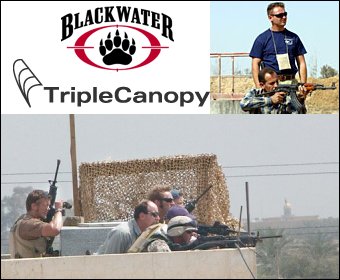April 10, 2004
Private Contractors vs. the Iraqi Insurgency

The murder of four civilian military contractors employed by Blackwater Security Consulting in Fallujah, Iraq recently, pointed up the presence of what is arguably the second largest military force (aside from U.S. military forces) in-country. Real questions are arising as to whether the U.S. is using civilian contractors as a means to limit the number of American troops on the ground, but at the same time, their presence creates major risks - both for contractors themselves, the Coalition Provisional Authority and their military counterparts. On top of this, the much better salaries commanded by private security personnel are attracting lots of special ops corps once they leave regular G.I. service.
Here's an excerpt from a Slate piece on how to define these personnel - mercenaries, noncombatants, lawful combatants or what?:
- Practically speaking, this legal murkiness creates real problems in Iraq. The law of armed conflict requires soldiers on both sides to distinguish between combatants and noncombatants. Armed U.S. contractors wearing quasimilitary outfits and body armor blur these distinctions, making it very hard for our enemies to play by the rules of war (assuming they wanted to in the first place). It also leaves these armed contractors open to treatment by foreign governments as unlawful combatants, U.S. citizenship notwithstanding. Should a group of armed contractors stray into Syria or Iran because of a GPS malfunction, it is entirely possible that they'd be locked up on these grounds.
Meanwhile, contractors from Blackwater held off an attack on U.S. headquarters in Najaf last Sunday:
- An attack by hundreds of Iraqi militia members on the U.S. government's headquarters in Najaf on Sunday was repulsed not by the U.S. military, but by eight commandos from a private security firm, according to sources familiar with the incident.
Before U.S. reinforcements could arrive, the firm, Blackwater Security Consulting, sent in its own helicopters amid an intense firefight to resupply its commandos with ammunition and to ferry out a wounded Marine, the sources said.
The role of Blackwater's commandos in Sunday's fighting in Najaf illuminates the gray zone between their formal role as bodyguards and the realities of operating in an active war zone. Thousands of armed private security contractors are operating in Iraq in a wide variety of missions and exchanging fire with Iraqis every day, according to informal after-action reports from several companies.
In Sunday's fighting, Shiite militia forces barraged the Blackwater commandos, four MPs and a Marine gunner with rocket-propelled grenades and AK-47 fire for hours before U.S. Special Forces troops arrived. A sniper on a nearby roof apparently wounded three men. U.S. troops faced heavy fighting in several Iraqi cities that day.
The Blackwater commandos, most of whom are former Special Forces troops, are on contract to provide security for the U.S.-led Coalition Provisional Authority (CPA) in Najaf.
With their ammunition nearly gone, a wounded and badly bleeding Marine on the rooftop, and no reinforcement by the U.S. military in the immediate offing, the company sent in helicopters to drop ammunition and pick up the Marine.
Finally, in a fascinating piece on recent developments, the Washington Post reports that, in light of the fact that private firms realistically cannot rely on U.S. military help if they get in a jam, they've teamed up to form their own intelligence network and alliances to watch one anothers' back:
- Under assault by insurgents and unable to rely on U.S. and coalition troops for intelligence or help under duress, private security firms in Iraq have begun to band together in the past 48 hours, organizing what may effectively be the largest private army in the world, with its own rescue teams and pooled, sensitive intelligence.
"Each private firm amounts to an individual battalion," said one U.S. government official familiar with the developments. "Now they are all coming together to build the largest security organization in the world."
Whatever the case, it's certainly the right time to be in the military consulting business.
- Arik
Posted by Arik Johnson at April 10, 2004 01:07 PM | TrackBack "Competitive Intelligence applies the lessons of competition and principles of intelligence to the need for every business to gain awareness and predictability of market risk and opportunity. By doing so, CI has the power to transform an enterprise from also-ran into a real winner, with agility enough to create and maintain sustainable competitive advantage."
"Competitive Intelligence applies the lessons of competition and principles of intelligence to the need for every business to gain awareness and predictability of market risk and opportunity. By doing so, CI has the power to transform an enterprise from also-ran into a real winner, with agility enough to create and maintain sustainable competitive advantage."
